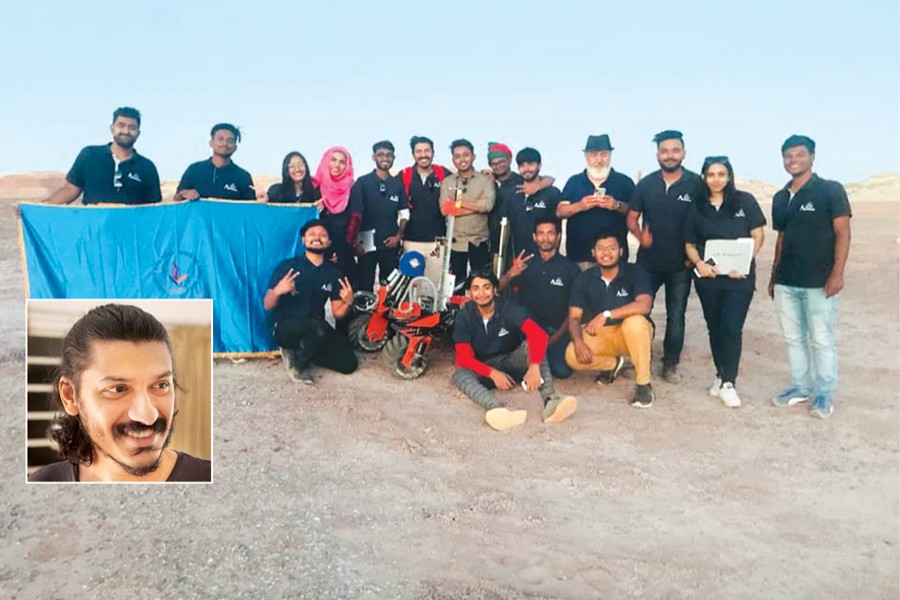Robotics competition
Winning team stresses studying contest guidelines properly

Published :
Updated :

Students from Bangladesh have consistently performed well in different international competitions. Recently, Team Attendant from Independent University, Bangladesh (IUB) secured the first position in Asia and sixth position globally, in the University Rover Challenge (URC) 2018 held at Utah, USA. The competition that took place between May 31 and June 02 this year, is known to be the world's biggest robotics competition for university students. It was organised by the Mars Society and sponsored by Protocase and Microsoft.
This year more than 90 teams submitted their proposals to participate in this competition from 12 countries. Following a fierce competition and challenging rounds, PCz Rover Team from the Czestochowa University of Technology clinched the first position. MRDT from Missouri University of Science and Technology, USA and Team IMPULS from the Kielce University of Technology secured second and third position respectively in the global competition.
Team Attendant of IUB consisted of Md Ashraful Amin, associate professor and head of department, Computer Science and Engineering, Abul Al Arabi and Md Wahidul Hasan -both research associates, Tanjina Piash Proma, research assistant, Faysal Ahmed, Md Rashedul Islam, Faisal Siddiquee, Zawad Nawaz, Akil Hamid Chowdhury, Rahul Banik, Prnabesh Sarkar, Tanjir Ahmed Emon, Md Sakib Hassan, Samira Fairuz Ahmed, Fariya Oyshi and Rahobar Anowar Rio- all students.
To know more about the competition, Shaha Rakesh Nishan interviewed Dr. M Ashraful Amin. Mr. Amin led the team during the competition as the head of that of IUB. Following are the excerpts of the interview.
Question(Q): How were the preparations different for this year compared to the last year?
Answer (A): Last year we participated in this competition for the first time and had little to no experience about URC as a team. As a result, we made some mistakes. This year we used the lessons learnt from last year and prepared ourselves accordingly. However, the tasks of each year are usually different, and as a result, a team can only work on the technical and physical aspects. After working on the learnings of last year, we managed to make our rover faster and covered more ground as a result. Besides, our rover weighed 5-6 kgs less this time, and we had more people on our team that helped us in the competition.
Q: Can you discuss about the tasks of the competition?
A: The teams required to make a promotional video and submit a report about their plan. The organisers then select the best teams to take part in the next stage of the competition. This year, for instance, 36 teams made to the next phase of the competition. On the event days, all the 36 teams took part in four different challenges, each offering new and varying challenges to the teams. The teams had to participate in rounds, namely, Extreme Retrieval and Delivery Task, Science Cache Task, Equipment Servicing Task and Autonomous Traversal Task. All these tasks are designed to challenge the teams to develop and create the next generation Mars rover that might successfully work alongside the astronauts soon for exploration purpose.
Q: Can you briefly discuss the overall experience of URC 2018?
A: URC 2018 has helped our team to enrich our learning in design, communications and mechanical aspects. Getting live and practical examples are always helpful to bolster the theoretical knowledge. Also, learning from the other teams and how they managed to perform better in a particular task will also help us in the future and this team in particular. However, we also learned that we still have loopholes in our plans. We need to work on our control and communication. Furthermore, we need to start working with AI with more effort. We performed poorly in the Autonomous Traversal Task, and this was as a result of our poor grasp in the AI sector.
Q: Did you face any obstacle in your way to designing the Rover or at any part during the competition?
A: The biggest obstacle was perhaps the most common one, financial. We required a good amount of funds to execute our plans. Starting from building the rover to travelling to the USA and participating in the event, costs were incurred in all the stages. However, we are grateful to IUB for helping us to tackle this hurdle. Not only did they contribute to accumulating the required funds, but they also helped to reach out to some private organisations and the ICT division of the Government of Bangladesh. All these organisations helped to gather funds for our project.
Another issue that we faced was the unavailability of specialised instruments in our country. As a result, we had to import most of it from China, which led to increasing costs and wastage of time.
Q: What would you like to suggest to the next generation of students who aspire to participate in URC?
A: My suggestion would be to know about the competition properly. I have seen many people have misconceptions about the rules and regulations. It is essential to have a bright idea about the guidelines first and then think about planning and execution. Besides, it is essential to have the basic concepts of electronics, programming, linear algebra and calculus well sorted out and learned.
The interviewer Shaha Rakesh Nishan is a final year student of BBA programme at the Institute of Business Administration (IBA), University of Dhaka. He can be reached at
nishanrakesh20@gmail.com


 For all latest news, follow The Financial Express Google News channel.
For all latest news, follow The Financial Express Google News channel.